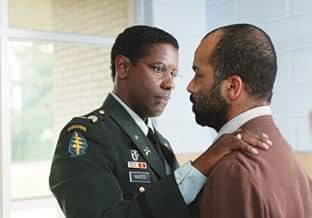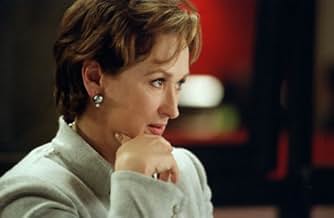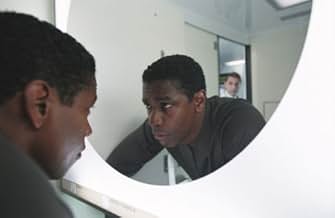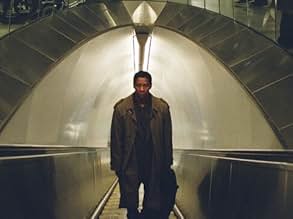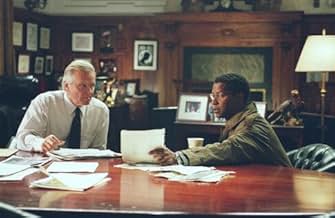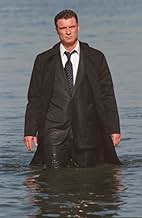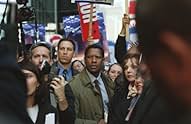En pleine guerre du Golfe, des soldats sont kidnappés et subissent un lavage de cerveau à des fins sinistres.En pleine guerre du Golfe, des soldats sont kidnappés et subissent un lavage de cerveau à des fins sinistres.En pleine guerre du Golfe, des soldats sont kidnappés et subissent un lavage de cerveau à des fins sinistres.
- Réalisation
- Scénario
- Casting principal
- Nomination aux 1 BAFTA Award
- 1 victoire et 12 nominations au total
Joe Alessi
- Boy Scout #2
- (as Joseph Alessi)
Raymond Anthony Thomas
- Scout Dad
- (as Ray Anthony Thomas)
Avis à la une
Here's something I never thought I'd say: I enjoyed parts of "The Manchurian Candidate" remake; it isn't as bad as I expected it to be.
And much of the credit goes to the three main players - Denzel Washington as the paranoid veteran, Liev Schreiber as the titular character and Meryl Streep as the power-hungry, Oedipally motivated Senator Eleanor Shaw.
Screenwriters Daniel Pyne and Dean Georgaris reinvent and contemporize Richard Condon's novel and the 1962 film. While John Frankenheimer's film, written by George Axelrod, was the apotheosis of the Cold War thriller and a scathing indictment of McCarthyism, Jonathan Demme's remake is less subtle in its approach and paranoia, but takes barbed jabs at current politics, the corruptibility of our elected leaders and paranoia disguised as patriotism in a post-9/11 America.
The remake also owes a debt of gratitude to Alan J. Pakula's brilliant 1974 paranoia-conspiracy thriller, "The Parallax View."
Although it isn't clear whether Raymond Shaw is a Republican or Democrat - his mother certainly seems more Republican in her outlook and politics - Demme and his writers' point is that all American politicians are bought and paid for by big business. As we all know, we never heeded President Eisenhower's prescient caution about the military industrial complex.
The villainous Manchurian Global clearly was inspired by Halliburton - there's even mention of the company getting no-bid contracts. Pay close attention and you'll hear pointed references about the use of private contractors by the military, malfunctioning touch-screen voting machines and our government's "compassionate vigilance." Also, look fast and you'll see a news crawl about a Wal-Mart-type chain and a newspaper story about our treatment of Muslims.
Washington's awfully convincing as a man fraying at the edges, whose grip on reality seems to be slowly slipping, and there were a few moments where Schreiber almost reminded me of Laurence Harvey.
Streep, on the other hand, proves why she is undoubtedly the best actress this nation has ever produced. Her Eleanor spits venom. We're utterly convinced why Raymond's such a cuckold. We can only imagine what his poor father must have endured. Streep occasionally comes close to being campy, but so completely dominates the screen that she scares us even when she chews ice.
But several other talented actors, including Jon Voight, Vera Farmiga, Dean Stockwell and Ted Levine, are used to little or no effect.
Some crucial plot elements make no sense. The Dr. Noyle scenario, for instance, proves to be illogical, especially when we learn more about him. Neither Pyne nor Georgaris attempted to rectify this deficiency. Also, the mysterious Muslim women are superfluous. I wonder if their bit wound up on the cutting-room floor.
The film contains an unmistakable cynical tone. As much as it's clearly an indictment of big business' control of politics, it also denounces our leaders' insistence on keeping the public on edge with terror alerts. And as Senator Shaw points out, "The assassin always dies. It's necessary for the national healing."
But after maintaining its cynicism for much of the film, it comes apart completely at the end. Demme and his writers cop out with a pointless and weak denouement. That gunshot you hear is Demme shooting himself in the foot.
It's almost as if they gave in to appease some mindless preview audience or dimwitted studio hack. Or, maybe they envisioned it just like this. Given my admiration of Demme, I'd like to think otherwise. Hope I'm right.
And much of the credit goes to the three main players - Denzel Washington as the paranoid veteran, Liev Schreiber as the titular character and Meryl Streep as the power-hungry, Oedipally motivated Senator Eleanor Shaw.
Screenwriters Daniel Pyne and Dean Georgaris reinvent and contemporize Richard Condon's novel and the 1962 film. While John Frankenheimer's film, written by George Axelrod, was the apotheosis of the Cold War thriller and a scathing indictment of McCarthyism, Jonathan Demme's remake is less subtle in its approach and paranoia, but takes barbed jabs at current politics, the corruptibility of our elected leaders and paranoia disguised as patriotism in a post-9/11 America.
The remake also owes a debt of gratitude to Alan J. Pakula's brilliant 1974 paranoia-conspiracy thriller, "The Parallax View."
Although it isn't clear whether Raymond Shaw is a Republican or Democrat - his mother certainly seems more Republican in her outlook and politics - Demme and his writers' point is that all American politicians are bought and paid for by big business. As we all know, we never heeded President Eisenhower's prescient caution about the military industrial complex.
The villainous Manchurian Global clearly was inspired by Halliburton - there's even mention of the company getting no-bid contracts. Pay close attention and you'll hear pointed references about the use of private contractors by the military, malfunctioning touch-screen voting machines and our government's "compassionate vigilance." Also, look fast and you'll see a news crawl about a Wal-Mart-type chain and a newspaper story about our treatment of Muslims.
Washington's awfully convincing as a man fraying at the edges, whose grip on reality seems to be slowly slipping, and there were a few moments where Schreiber almost reminded me of Laurence Harvey.
Streep, on the other hand, proves why she is undoubtedly the best actress this nation has ever produced. Her Eleanor spits venom. We're utterly convinced why Raymond's such a cuckold. We can only imagine what his poor father must have endured. Streep occasionally comes close to being campy, but so completely dominates the screen that she scares us even when she chews ice.
But several other talented actors, including Jon Voight, Vera Farmiga, Dean Stockwell and Ted Levine, are used to little or no effect.
Some crucial plot elements make no sense. The Dr. Noyle scenario, for instance, proves to be illogical, especially when we learn more about him. Neither Pyne nor Georgaris attempted to rectify this deficiency. Also, the mysterious Muslim women are superfluous. I wonder if their bit wound up on the cutting-room floor.
The film contains an unmistakable cynical tone. As much as it's clearly an indictment of big business' control of politics, it also denounces our leaders' insistence on keeping the public on edge with terror alerts. And as Senator Shaw points out, "The assassin always dies. It's necessary for the national healing."
But after maintaining its cynicism for much of the film, it comes apart completely at the end. Demme and his writers cop out with a pointless and weak denouement. That gunshot you hear is Demme shooting himself in the foot.
It's almost as if they gave in to appease some mindless preview audience or dimwitted studio hack. Or, maybe they envisioned it just like this. Given my admiration of Demme, I'd like to think otherwise. Hope I'm right.
While the 2004 remake of "The Manchurian Candidate" is ensemble acting at its finest, Meryl Streep seems to be having a bit too much fun playing the villainess Eleanor Prentiss Shaw. She doesn't have the same blood-curdling constitution as did Angela Lansbury.
"What was I supposed to do, call a MEETING?" she exclaims as her wimpy male colleagues in the shadowy Manchurian Global upbraid her for ordering someone killed without consulting them. Problem is, she was radiantly glowing when she uttered the line, which produced laughs in the NYC theatre I was in.
When she showers Liev Schreiber with overly affectionate kisses and hugs, one again suspects Meryl was having a bit too much fun on camera with someone she finds quite attractive -- don't we all? -- in real life.
On its own, the 2004 remake is fine cinema. But the problem with all remakes is the inevitable comparison with original. And sadly, as much as I like the 2004 version, my vote goes with Angie Lansbury and Laurence Harvey.
"What was I supposed to do, call a MEETING?" she exclaims as her wimpy male colleagues in the shadowy Manchurian Global upbraid her for ordering someone killed without consulting them. Problem is, she was radiantly glowing when she uttered the line, which produced laughs in the NYC theatre I was in.
When she showers Liev Schreiber with overly affectionate kisses and hugs, one again suspects Meryl was having a bit too much fun on camera with someone she finds quite attractive -- don't we all? -- in real life.
On its own, the 2004 remake is fine cinema. But the problem with all remakes is the inevitable comparison with original. And sadly, as much as I like the 2004 version, my vote goes with Angie Lansbury and Laurence Harvey.
7=G=
"The Manchurian Candidate (2004)" is a par knock-off of the 1962 classic adapted from the same novel with the usual upgrades and contemporary tweaks. Sporting a good cast and a somewhat cluttered screenplay, the film tells of the plight of a Desert Storm vet (Washington) whose dreams tell a story of what happened to his platoon in Kuwait quite different from the historical account of record with ramifications reaching deep into a U.S. presidential election. A little bulky at two hours, this suspense/drama flick waxes in convolutions and intrigues all the while dangling the "dreams or reality?" question before the audience. With par murmurs from critical corners and mixed commentary from the public in general, this three star flick is probably worth a look for fans of the players or anyone into political thrillers, etc. (B)
I have to admit, I was horrified to see that someone was remaking the 1964 near-masterpiece. I had no intention of seeing it, but then I happened to catch Demme and Washington on "Charlie Rose", and Demme put my mind to rest that he was not trying to remake the original picture. I was still skeptic, but I decided to have an open mind and check it out for myself. I'm glad I did.
The only thing this film has in common with the 1964 film is a political background, a domineering mother, and the brainwashing angle (which is done significantly differently here). This film is about what's happening now, and it's as gutsy as any film in today's political climate can possibly get. The story is told through the inflamed, paranoid POV of a Gulf War veteran who tries to unveil a plot between a corporate hierarchy (that's involved in the defense industries and medical technologies among other things) and certain politicians who want to stake their influence on a vice presidential nominee. This 'influence' is achieved through the brainwashing of the nominee as well as several soldiers who had been stationed with him in Kuwait.
Political machinery and defense industries have always been dangerous bedfellows, but when the politicians actually have worked in, and have personal interests in those industries, the motivations of such a partnership can be used to exploit the public in all sorts of ominous ways. This film brilliantly places the sort of paranoia that can derive from such precarious matches as a sign of our times. Consciously or subconsciously, conspiracies are on all of our minds. Today, because there is so much secrecy in the current administration, no one knows just how terrible OR innocent these guys might really be. And where there is secrecy, there will be conspiracy theories galore. Paranoia is so commonplace in such a society that it is technically very easy for plots and lies to thrive healthfully. We tell ourselves, "the government is honest and probably has good reasons to keep secrets from the public, so those who see plots and conspiracies must all simply be deluded and paranoid. Right?"
The fact is that politicians can easily lie, and the media, instead of demanding the truth, puts outrageous spins on those lies claiming to present them as 'facts'. This becomes an almost intolerable static that begins to blot out all meaning. One of the most ingenious things about this film is in its use of that kind of static. Throughout much of the film, there is a cacophony of radios and TV spewing out their obligatory spins simultaneously, as well as the nearly constant sounds of traffic and people talking over one another. The people in this movie can hear, but no one is listening. There's also a proverbial static between science and technology and the moral questions that remain elusive. The survivors of the brainwashing experiment mentioned above, have little chips implanted in their backs that somehow aid the brainwashers. The chips could be some sort of homing device, or perhaps some sort of hormone moderator that's supposed to keep the men in the mental state that makes them more easily susceptible to hypnotic suggestion. Well, chips that can serve as homing devices, or that can regulate hormones and amino acids such as tryptophan, are in the experimental phase today. In other words, this isn't way-out science fiction here!
Okay, I know I'm sounding like I'm paranoid and that I'm saying that everything in this film can and will happen. Don't worry, I know this is just a movie and that the events depicted in it are EXTREMELY unlikely to ever take place. What I'm focusing on is how well the film takes themes, facts and situations that are topical and at least emotionally legitimate, and presents them in the context of a whopper of a good thriller. The film is fresh and audacious and honest in all of its approaches, with the one exception of Meryl Streep who seems to think she's in a Bette Davis movie. In the original "Manchurian Candidate" Angela Lansbury played her role, and she was appropriately icy, deliberate, and almost iconic in the way she carried her power. For some reason Streep tried to go to self-consciously comic proportions (you can almost see her winking at the audience saying "don't you just LOVE how bad I am?"). The rest of the performances however, are appropriately sober and solid. I never caught Washington acting, and Schrieber is masterful in the way he consolidates the conscious and subconscious friction of his character's agony into an invisible but palpable tension. The score by Rachel Portman is eerily reminiscent of Howard Shore's score for "Silence of the Lambs", and just as exciting and effective. And I can't help but thrill over Wyclef Jean's fantastic rendition of the CCR song "Fortunate One": a version as appropriate to this decade as the original version was to the late sixties (check out the lyrics: replace 'senator's son' with 'president's' son, and see if George W. Bush doesn't come to mind!).
Finally, is this film as good as the original version? They're so different I honestly can't compare. I can only say that this film is as appropriate to the political and sociological climate of today as the original was to its day. Don't forget both versions were based on a novel, so comparisons should be made in that context more than anything else (I haven't read the book so I can't comment on that). There are some loopholes in the current film's plot, and I do love the cinematic style of the original film more than this one. But as I was only a kid when the first film came out, this film has a slightly stronger emotional impression on me than the other one. I only hope all it stays science fiction!
The only thing this film has in common with the 1964 film is a political background, a domineering mother, and the brainwashing angle (which is done significantly differently here). This film is about what's happening now, and it's as gutsy as any film in today's political climate can possibly get. The story is told through the inflamed, paranoid POV of a Gulf War veteran who tries to unveil a plot between a corporate hierarchy (that's involved in the defense industries and medical technologies among other things) and certain politicians who want to stake their influence on a vice presidential nominee. This 'influence' is achieved through the brainwashing of the nominee as well as several soldiers who had been stationed with him in Kuwait.
Political machinery and defense industries have always been dangerous bedfellows, but when the politicians actually have worked in, and have personal interests in those industries, the motivations of such a partnership can be used to exploit the public in all sorts of ominous ways. This film brilliantly places the sort of paranoia that can derive from such precarious matches as a sign of our times. Consciously or subconsciously, conspiracies are on all of our minds. Today, because there is so much secrecy in the current administration, no one knows just how terrible OR innocent these guys might really be. And where there is secrecy, there will be conspiracy theories galore. Paranoia is so commonplace in such a society that it is technically very easy for plots and lies to thrive healthfully. We tell ourselves, "the government is honest and probably has good reasons to keep secrets from the public, so those who see plots and conspiracies must all simply be deluded and paranoid. Right?"
The fact is that politicians can easily lie, and the media, instead of demanding the truth, puts outrageous spins on those lies claiming to present them as 'facts'. This becomes an almost intolerable static that begins to blot out all meaning. One of the most ingenious things about this film is in its use of that kind of static. Throughout much of the film, there is a cacophony of radios and TV spewing out their obligatory spins simultaneously, as well as the nearly constant sounds of traffic and people talking over one another. The people in this movie can hear, but no one is listening. There's also a proverbial static between science and technology and the moral questions that remain elusive. The survivors of the brainwashing experiment mentioned above, have little chips implanted in their backs that somehow aid the brainwashers. The chips could be some sort of homing device, or perhaps some sort of hormone moderator that's supposed to keep the men in the mental state that makes them more easily susceptible to hypnotic suggestion. Well, chips that can serve as homing devices, or that can regulate hormones and amino acids such as tryptophan, are in the experimental phase today. In other words, this isn't way-out science fiction here!
Okay, I know I'm sounding like I'm paranoid and that I'm saying that everything in this film can and will happen. Don't worry, I know this is just a movie and that the events depicted in it are EXTREMELY unlikely to ever take place. What I'm focusing on is how well the film takes themes, facts and situations that are topical and at least emotionally legitimate, and presents them in the context of a whopper of a good thriller. The film is fresh and audacious and honest in all of its approaches, with the one exception of Meryl Streep who seems to think she's in a Bette Davis movie. In the original "Manchurian Candidate" Angela Lansbury played her role, and she was appropriately icy, deliberate, and almost iconic in the way she carried her power. For some reason Streep tried to go to self-consciously comic proportions (you can almost see her winking at the audience saying "don't you just LOVE how bad I am?"). The rest of the performances however, are appropriately sober and solid. I never caught Washington acting, and Schrieber is masterful in the way he consolidates the conscious and subconscious friction of his character's agony into an invisible but palpable tension. The score by Rachel Portman is eerily reminiscent of Howard Shore's score for "Silence of the Lambs", and just as exciting and effective. And I can't help but thrill over Wyclef Jean's fantastic rendition of the CCR song "Fortunate One": a version as appropriate to this decade as the original version was to the late sixties (check out the lyrics: replace 'senator's son' with 'president's' son, and see if George W. Bush doesn't come to mind!).
Finally, is this film as good as the original version? They're so different I honestly can't compare. I can only say that this film is as appropriate to the political and sociological climate of today as the original was to its day. Don't forget both versions were based on a novel, so comparisons should be made in that context more than anything else (I haven't read the book so I can't comment on that). There are some loopholes in the current film's plot, and I do love the cinematic style of the original film more than this one. But as I was only a kid when the first film came out, this film has a slightly stronger emotional impression on me than the other one. I only hope all it stays science fiction!
In brief comparison, I adore the 1962 film and consider it one of the best of the 60s. This remake is far from the worst remake in existence(the remake to Psycho should never have been made) plus it does have its good points. The film is well made with stylish cinematography and striking locations. The acting is above decent, Denzel Washington does well filling Frank Sinatra's shoes, Liev Schreiber literally sinks his teeth into his role and Meryl Streep does make an impression as Schreiber's unscrupulous mother. The film does also try hard to evoke a chilling atmosphere and does succeed at times. However, Jonathan Demme's direction lacks subtlety and control. Also the script is pretty weak coming across as hackneyed, the story is extremely complex and too convoluted and the film drags making the (just over) 2 hour film rather dull. All in all, not bad but disappointing. 5/10 Bethany Cox
Le saviez-vous
- AnecdotesTina Sinatra, who was instrumental in deciding to remake the film, inherited the production rights from her father, Frank Sinatra, who played Bennett Marco in the 1962 version.
- GaffesMen and women in military uniforms are shown on stage at the convention. It is against the law for military personnel in uniform to participate in partisan political activity.
- Citations
Eleanor Shaw: The assassin always dies, baby. It's necessary for the national healing.
- ConnexionsFeatured in Jonathan Demme and the Making of 'The Manchurian Candidate' (2004)
- Bandes originalesFortunate Son
Written by John Fogerty (as John C. Fogerty)
Performed & Produced by Wyclef Jean
Wyclef Jean performs courtesy of J Records
Meilleurs choix
Connectez-vous pour évaluer et suivre la liste de favoris afin de recevoir des recommandations personnalisées
- How long is The Manchurian Candidate?Alimenté par Alexa
Détails
- Date de sortie
- Pays d’origine
- Langue
- Aussi connu sous le nom de
- El Embajador Del Miedo
- Lieux de tournage
- Sociétés de production
- Voir plus de crédits d'entreprise sur IMDbPro
Box-office
- Budget
- 80 000 000 $US (estimé)
- Montant brut aux États-Unis et au Canada
- 65 955 630 $US
- Week-end de sortie aux États-Unis et au Canada
- 20 018 620 $US
- 1 août 2004
- Montant brut mondial
- 96 105 910 $US
- Durée2 heures 9 minutes
- Couleur
- Mixage
- Rapport de forme
- 1.85 : 1
Contribuer à cette page
Suggérer une modification ou ajouter du contenu manquant

Lacune principale
What was the official certification given to Un crime dans la tête (2004) in Mexico?
Répondre



